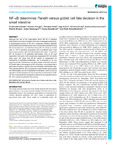NF-κB determines Paneth versus goblet cell fate decision in the small intestine
Brischetto, Cristina
Krieger, Karsten
Klotz, Christian
Krahn, Inge
Kunz, Séverine
Kolesnichenko, Marina
Mucka, Patrick
Heuberger, Julian
Scheidereit, Claus
Schmidt-Ullrich, Ruth
Although the role of the transcription factor NF-κB in intestinal inflammation and tumor formation has been investigated extensively, a physiological function of NF-κB in sustaining intestinal epithelial homeostasis beyond inflammation has not been demonstrated. Using NF-κB reporter mice, we detected strong NF-κB activity in Paneth cells, in ‘+4/+5’ secretory progenitors and in scattered Lgr5+ crypt base columnar stem cells of small intestinal (SI) crypts. To examine NF–κB functions in SI epithelial self-renewal, mice or SI crypt organoids (‘mini-guts’) with ubiquitously suppressed NF-κB activity were used. We show that NF-κB activity is dispensable for maintaining SI epithelial proliferation, but is essential for ex vivo organoid growth. Furthermore, we demonstrate a dramatic reduction of Paneth cells in the absence of NF-κB activity, concomitant with a significant increase in goblet cells and immature intermediate cells. This indicates that NF-κB is required for proper Paneth versus goblet cell differentiation and for SI epithelial homeostasis, which occurs via regulation of Wnt signaling and Sox9 expression downstream of NF-κB. The current study thus presents evidence for an important role for NF-κB in intestinal epithelial self-renewal.
Files in this item

